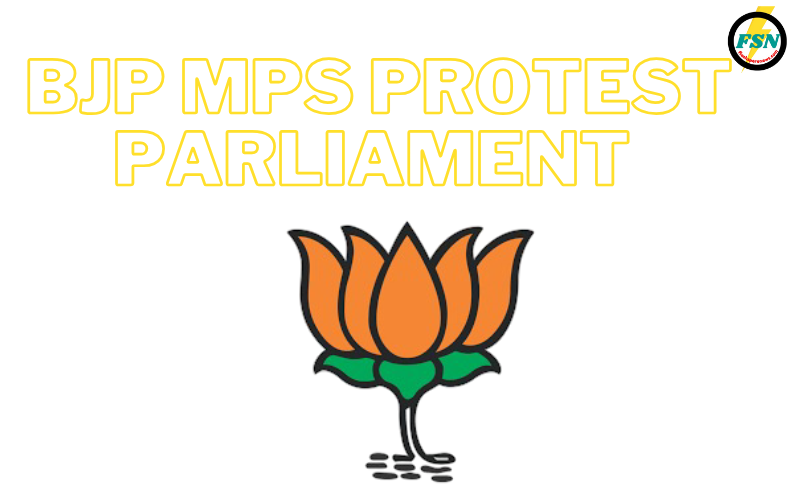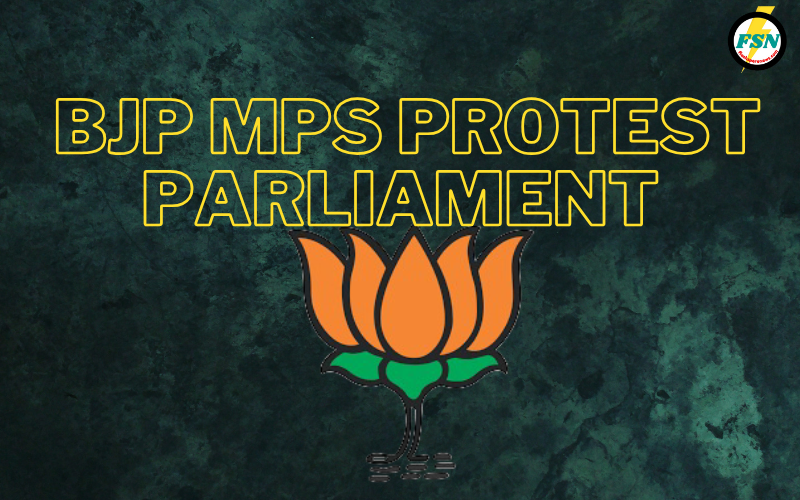BJP MPs Protest Parliament Panel’s Invite to Medha Patkar and Prakash Raj: Political Firestorm Erupts in Delhi
In a dramatic turn of events in New Delhi, the Indian political landscape witnessed a heated uproar as BJP MPs Protest Parliament proceedings over the invitation extended to activist Medha Patkar and actor Prakash Raj. The invite, issued by a parliamentary panel, quickly turned controversial and was met with severe resistance from Bharatiya Janata Party lawmakers. The subsequent cancellation of the scheduled meeting has triggered a national debate, with many questioning the intent, implications, and political sensitivity of such a decision.
The BJP MPs Protest Parliament event wasn’t a casual political disagreement—it transformed into a powerful demonstration of dissent. The protest saw the participation of several prominent BJP MPs who voiced their objections in unison, demanding an explanation from the parliamentary panel responsible for the controversial move. The cancellation of the meeting only escalated the issue, drawing national media attention and evoking strong reactions from all political corners.
Parliament Erupts: BJP MPs Protest Parliament Over Invite to Medha Patkar
Medha Patkar has long been a polarizing figure in Indian politics. Known for her activism during the Narmada Bachao Andolan, she has consistently clashed ideologically with the BJP. Many within the BJP view her stance as anti-development and accuse her of jeopardizing national interests under the guise of activism. Her inclusion in a parliamentary panel discussion was interpreted by BJP MPs as not just provocative but deeply offensive.
The presence of Prakash Raj alongside Patkar further fueled the fire. A vocal critic of the BJP, Raj’s political alignment and past statements made him an equally contentious figure. Together, their proposed participation led to a severe backlash, encapsulated in the headline-worthy BJP MPs Protest Parliament campaign that unfolded on the steps of India’s legislature.
Sources confirm that the protest wasn’t a spontaneous reaction but a coordinated response by the BJP to send a strong message. The aim was clear: to question the credibility and neutrality of parliamentary panels and to assert that figures who openly oppose government policy and national development plans should not be given an official platform within the democratic framework.
BJP MPs Protest Parliament: A Reflection of Political Ideological Battle
The larger narrative surrounding the BJP MPs Protest Parliament saga reflects deep ideological battles that continue to shape Indian democracy. The BJP’s primary contention is that figures like Patkar and Raj have repeatedly taken stances that undermine national interests, especially in relation to development and governance. Their inclusion in the parliamentary discourse, therefore, is viewed as a compromise to the values the BJP seeks to uphold.
Critics argue that such protests by elected representatives threaten the spirit of democratic debate. They question whether BJP MPs Protest Parliament is a sign of growing intolerance within the ruling party toward dissenting voices. However, BJP supporters maintain that their protest is a necessary stance against what they describe as left-leaning intellectual propaganda being legitimized by official institutions.
The BJP, in multiple press releases and interviews, reiterated that the protest was not against democratic values but a defense of them. By staging the BJP MPs Protest Parliament, they aimed to uphold accountability and fairness in the selection process for panel discussions. According to their view, those with a history of political antagonism toward the government should not be invited to influence legislative discourse.
BJP MPs Protest Parliament: Opposition Reacts to Meeting Cancellation
The opposition has predictably pounced on the issue. Several Congress leaders accused the BJP of stifling free speech and curbing democratic functioning. According to them, the BJP MPs Protest Parliament was a strategic move to divert attention from more pressing national issues such as inflation, unemployment, and economic slowdown. In contrast, the BJP retorted that the presence of figures like Patkar and Raj would have turned a parliamentary platform into a political battleground.
The cancellation of the meeting was announced after an emergency session convened to address the chaos. While the official reason cited was a “procedural misstep,” insiders revealed that the intensity of the BJP MPs Protest Parliament forced the committee’s hand. The political cost of going ahead with the meeting was considered too high.
The incident also sparked sharp commentary across social media, with hashtags like #BJPMPsProtestParliament trending nationally. Several BJP leaders shared visuals of the protest, emphasizing the unity among party members and their commitment to protecting the dignity of the parliamentary process.
BJP MPs Protest Parliament: What It Means for Future Panel Discussions
This protest may have set a precedent. The BJP MPs Protest Parliament episode has already started influencing how future parliamentary panel invitations will be scrutinized. Political observers note that the incident has empowered ruling party MPs to exercise veto-like influence over the democratic invite process. Whether this is a good or bad development remains hotly contested.
The Standing Committee’s role in organizing panel discussions is now under sharp review. Several members of the BJP have demanded clearer guidelines to ensure that individuals with strong partisan leanings are not inadvertently legitimized through official invites. The BJP MPs Protest Parliament movement, in this context, becomes more than a political episode—it is a statement of ideological boundaries.
It also brings into focus the nature of parliamentary decorum. Should an elected body reflect all views, including those considered fringe or adversarial? Or should there be a moral filter applied based on past conduct and alignment with national interests? The BJP MPs Protest Parliament debate touches on these fundamental questions.

BJP MPs Protest Parliament: Media, Public Reaction and Political Ripple Effects
Mainstream and regional media have been divided in their coverage. While some condemned the protest as a blow to intellectual plurality, others hailed it as a necessary political stance. Prime-time debates were filled with fiery exchanges, mirroring the tone of the BJP MPs Protest Parliament itself.
Public reaction, too, was polarized. Supporters of the BJP argued that the protest showed strength and unity. Detractors claimed it reflected authoritarian tendencies within the ruling establishment. Regardless of the viewpoint, one thing is clear: BJP MPs Protest Parliament became a defining moment in how Indian democracy handles ideological discomfort within legislative frameworks.
Several political analysts believe the BJP will use this episode as a campaign theme in upcoming elections. The BJP MPs Protest Parliament storyline provides a strong emotional and ideological hook to reinforce their narrative of safeguarding national interest and opposing what they term as “anti-national elements.”
BJP MPs Protest Parliament: The Underlying Institutional Clash and Fallout
The core of the BJP MPs Protest Parliament controversy also underscores the growing tension between elected lawmakers and institutional bodies. The invitation to Medha Patkar and Prakash Raj, while defended as inclusive and democratic by panel members, was interpreted by BJP MPs as a deliberate challenge to the values the party has sought to establish since coming to power.
Many within the BJP argued that the act of inviting individuals with controversial views reflects a pattern of elite intellectualism that is disconnected from the grassroots realities of India. They claimed that through such invites, voices with limited electoral credibility but amplified media reach are given a platform to influence policy indirectly. The BJP MPs Protest Parliament was, in part, a reaction against this perceived imbalance.
This raises questions about the broader role of parliamentary panels: Are they meant to encourage diverse input regardless of political background, or should they maintain ideological alignment with the current majority? The BJP MPs Protest Parliament movement strongly suggests that the BJP views the latter as essential to maintaining political integrity.
Supporters of the protest say the Parliament is not a debating society for celebrities or controversial activists, but a place for national interest and governance. They assert that when the BJP MPs Protest Parliament, they are rejecting the glamourization of ideological dissent. Opponents counter that such a move risks undermining pluralism and reduces legislative platforms to echo chambers.
This institutional clash has also affected the internal dynamics of the panel itself. Several members from opposition parties have voiced concern over what they see as increasing pressure on the panel to conform to ideological lines. Some have even suggested that future discussions could be boycotted if similar interventions continue. The BJP MPs Protest Parliament saga, therefore, has long-term implications for parliamentary functioning and inter-party cooperation.
BJP MPs Protest Parliament: Legal, Ethical and Public Trust Implications
One of the most critical aspects of the BJP MPs Protest Parliament episode is its legal and ethical dimensions. While no laws were broken in extending the invitation, questions have been raised about the intent and foresight of the organizing committee. Should individuals who have been involved in protests against the government, and in Patkar’s case, who have faced legal challenges, be considered valid voices for parliamentary discussion?
Supporters of the protest say no—arguing that allowing such figures legitimizes anti-national narratives. Opponents argue that such exclusion is anti-democratic and sets a dangerous precedent of ideological gatekeeping. This ethical dilemma is now at the heart of the BJP MPs Protest Parliament conversation.
Legal experts have also weighed in, suggesting that parliamentary panels are not above scrutiny and must justify their decisions in the public domain. While the BJP has not taken legal action, their strong public statements suggest that future invites of a similar nature could face not just protests but legal challenges.
Trust in the parliamentary process is also at stake. With each instance like BJP MPs Protest Parliament, there is a risk that the public sees these bodies as increasingly politicized. This erodes the institutional credibility that is essential for the smooth functioning of democracy. Both the panel and the protesting MPs now carry the responsibility of rebuilding that trust.
BJP MPs Protest Parliament: Broader Lessons for Indian Democracy
The larger takeaway from the BJP MPs Protest Parliament episode is not just about the inclusion or exclusion of certain individuals in a meeting. It is a mirror reflecting the state of democratic engagement in India. When elected representatives vocally oppose the inclusion of dissenting voices, it sparks critical questions about how much space Indian democracy truly provides for contrarian thought.
It also serves as a warning for how institutional protocols can easily be politicized in a polarized political environment. If each decision is seen through an ideological lens, governance and policy-making risk becoming secondary to perception battles. The BJP MPs Protest Parliament protest, thus, stands as a cautionary tale about the risks of excessive politicization in legislative functioning.


